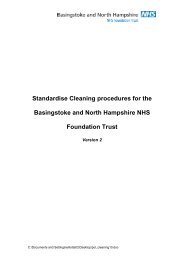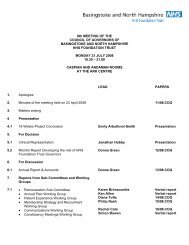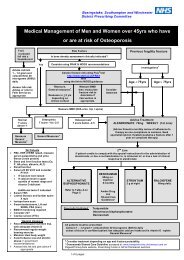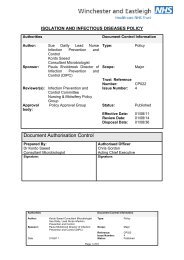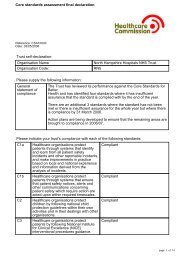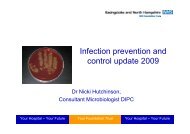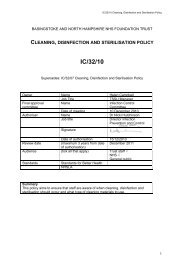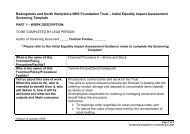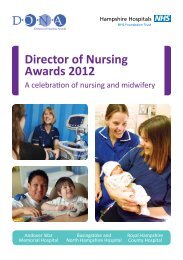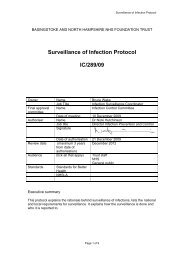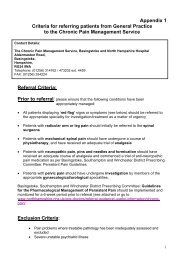Policy for the management and control of diarrhoea and vomiting
Policy for the management and control of diarrhoea and vomiting
Policy for the management and control of diarrhoea and vomiting
Create successful ePaper yourself
Turn your PDF publications into a flip-book with our unique Google optimized e-Paper software.
Winchester & Eastleigh Healthcare NHS Trust<br />
POLICY FOR THE MANAGEMENT AND CONTROL OF DIARRHOEA<br />
AND VOMITING (NOROVIRUS) INFECTIONS<br />
patients in <strong>the</strong> bay are symptom free, not just <strong>the</strong> person <strong>the</strong>y are planning<br />
to visit. If visitors choose to visit a closed bay <strong>the</strong>y should wear gloves <strong>and</strong><br />
aprons <strong>and</strong> wash <strong>the</strong>ir h<strong>and</strong>s be<strong>for</strong>e entering <strong>and</strong> leaving. If o<strong>the</strong>r patients in<br />
<strong>the</strong> same ward are symptomatic, again <strong>the</strong> visit should be deferred.<br />
17.11 To ensure <strong>the</strong>re are adequate stocks <strong>of</strong> gloves, aprons, linen, disposable<br />
bedpans <strong>and</strong> vomit bowls.<br />
17.12 To ensure that any member <strong>of</strong> staff affected must be sent home<br />
immediately.<br />
17.13 Visiting staff e.g. Occupational Therapists (OT), Physio<strong>the</strong>rapists <strong>and</strong><br />
Social Workers<br />
17.14 If <strong>the</strong> patient is symptomatic <strong>and</strong> <strong>the</strong> visit is not urgent <strong>the</strong>y should delay <strong>the</strong><br />
visit. If <strong>the</strong> visit is essential, gloves <strong>and</strong> aprons should be worn <strong>and</strong> make<br />
<strong>the</strong> visit as brief as possible. H<strong>and</strong>s must be washed with soap <strong>and</strong> water<br />
once PPE has been removed. Visits to <strong>the</strong> affected ward should be made at<br />
<strong>the</strong> end <strong>of</strong> <strong>the</strong> shift. If <strong>the</strong> visiting <strong>the</strong>rapist has to work on an affected ward<br />
<strong>and</strong> <strong>the</strong>n carry out home visits he/she should wear scrubs whilst on <strong>the</strong> ward<br />
<strong>and</strong> wear uni<strong>for</strong>m <strong>for</strong> <strong>the</strong> home visit. Staff must not sit on <strong>the</strong> bed but use <strong>the</strong><br />
chairs provided <strong>for</strong> visitors. Notes, x-rays <strong>and</strong> o<strong>the</strong>r equipment should not<br />
be placed on <strong>the</strong> bed.<br />
Once a patient has recovered from <strong>diarrhoea</strong> / <strong>vomiting</strong> <strong>the</strong>ir rehabilitation<br />
<strong>and</strong> <strong>the</strong>rapies should recommence. The patient can leave <strong>the</strong> ward or visit<br />
<strong>the</strong> OT kitchen area when 48 hours symptom free.<br />
17.15 Bank & Agency staff<br />
17.16 Where possible bank staff should only work on an affected ward or non<br />
affected ward but not on both. Bank staff can work on a ward affected by<br />
<strong>diarrhoea</strong> <strong>and</strong> <strong>vomiting</strong> BUT cannot move straight to ano<strong>the</strong>r ward without<br />
first ideally showering <strong>and</strong> at a minimum changing <strong>the</strong>ir uni<strong>for</strong>ms. If<br />
avoidable, staff should work on unaffected wards first <strong>the</strong>n <strong>the</strong> affected<br />
ward.<br />
Agency staff are not permitted by <strong>the</strong> agency to work on a ward closed with<br />
<strong>diarrhoea</strong> / <strong>vomiting</strong>.<br />
18 Ward closure – refer to CP077 - <strong>Policy</strong> <strong>for</strong> Ward Closure due to an Infection<br />
Control Issue.<br />
19 Outbreak Control Group – refer to CP077 Ward Closure policy / CP071<br />
Major Outbreak Plan.<br />
Authorities<br />
Document Control In<strong>for</strong>mation<br />
Author:<br />
Dr Parnaby<br />
Type:<br />
<strong>Policy</strong><br />
Consultant Microbiologist<br />
Sponsor: Members <strong>of</strong> <strong>the</strong> Infection Prevention & Scope:<br />
Major<br />
Control Committee<br />
Reference:<br />
CP101<br />
Issue Number: 2<br />
Date July 2011 Status: Published<br />
Page 16 <strong>of</strong> 26



